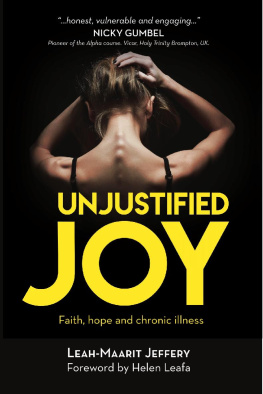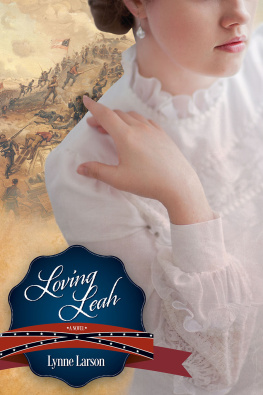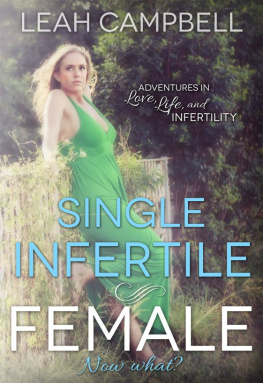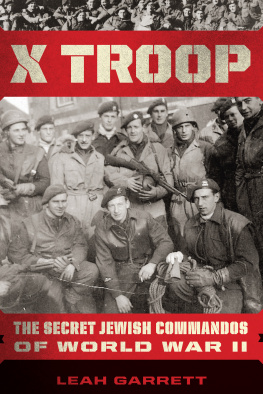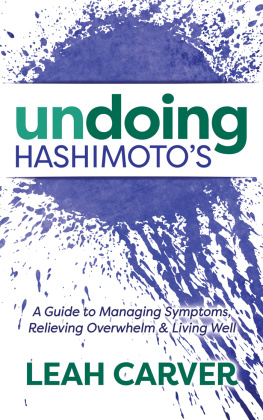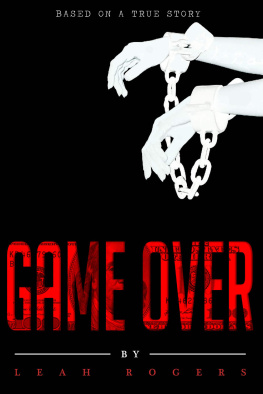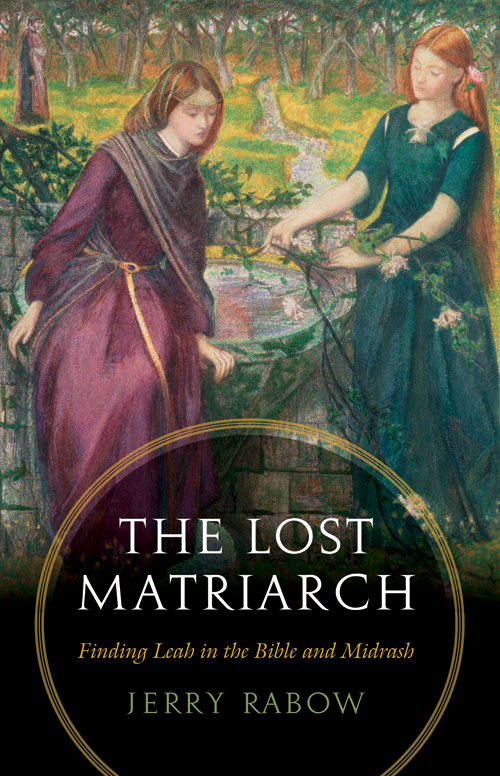
With imaginative insight, Jerry Rabow has placed a human face and heart onto the persona of this biblical drama of love, loyalty, and intrigue. The author endows this ancient romance with empathic contemporary relevance.
Rabbi Harold M. Schulweis, author of Conscience: The Duty to Obey and the Duty to Disobey and founder of the Jewish Foundation for the Righteous and the Jewish World Watch
The Lost Matriarch
The Lost Matriarch
Finding Leah in the Bible and Midrash
Jerry Rabow

The Jewish Publication Society | Philadelphia
University of Nebraska Press | Lincoln
2014 by the Board of Regents of the University of Nebraska. All rights reserved. Published by the University of Nebraska Press as a Jewish Publication Society book.
Cover image Tate, London 2014.
Library of Congress Cataloging-in-Publication Data
Rabow, Jerry, 1937
The lost matriarch: finding Leah in the Bible and Midrash / Jerry Rabow.
pages cm
Published by the University of Nebraska Press as a Jewish Publication Society book.
Includes bibliographical references and index.
ISBN 978-0-8276-1207-5 (pbk.: alk. paper)
ISBN 978-0-8276-1180-1 (epub)
ISBN 978-0-8276-1181-8 (mobi)
ISBN 978-0-8276-1179-5 (pdf)
1. Leah (Biblical matriarch) 2. Leah (Biblical matriarch)In rabbinical literature. 3. Jacob (Biblical patriarch) I. Title.
BS 580. L 43 R 33 2014
222'.11092dc23
2014011422
The publisher does not have any control over and does not assume any responsibility for author or third-party websites or their content.
The greatness of a teacher can be measured by how much you learn; the greatness of a rabbi can be measured by how much you change. This book is dedicated with deepest affection and gratitude to my great teacher and rabbi of more than forty years, Harold M. Schulweis, who taught me so much more than I thought I was searching for, and who changed me so much more than I imagined possible.
And this book about Leah is also dedicated to my Leahmy wife Lola (Leah bat Yitzhak uPeninah), who will always be my Leah the Loved.
Contents
Why a book about Leah? Other biblical heroines perform more impressive deeds and deliver more memorable speeches than Leah. After Deborah leads the Israelites in a grand battle against the Canaanites, she commemorates her victory in a song of praise to God (Judg. 4:45:31). Hannah resolutely corrects the mistaken accusations of the priest and later expresses her thanks for the birth of Samuel in a song of prayer (1 Sam. 1:12:10). And in the Apocrypha, Judith saves the Israelites by killing the Assyrian general Holophernes, memorializing her victory in a song of glory to God (Jdt. 8:116:25). But the Bible does not describe any great victories for Leah, and she doesnt deliver any impressive prayer-songs.
It is true that Leah is a member of that exclusive club of biblical heroines whom we remember as our Matriarchs. In contrast with how the Bible describes the other Matriarchs, however, the text remains stubbornly mute about Leahs words and deeds. Those other Matriarchs are shown living brave and memorable lives of action and initiative, performing acts that change their families as well as the destiny of the Jewish people: Sarah protects her son by demanding the removal of his half brother Ishmael, a proposal expressly ratified by God (Gen. 21:913). Rebekah in turn intervenes for Jacob, her favorite son, by orchestrating Isaacs blessing ceremony so that it will be for the benefit of Jacob and ultimately for the Children of Israel (Gen. 27:517). And Leahs sister, Rachel, forcefully assumes responsibility over her own life and her posterity when she resolutely seeks to bear the children initially denied to her (Gen. 30:18, 1415, 24).
But the Bible describes very few of Leahs qualities, recounts very few of her actions, and quotes even fewer of her statements. As a consequence, her position in the remembrance and affection of people throughout history seems slight in comparison with the popular regard for other biblical Matriarchs and heroines. To the extent that Leah is remembered by the people, this seems attributable more to reverence for her illustrious descendants than any appreciation or even awareness of her personal qualities. Leah has become our Lost Matriarch.
All these points certainly seem to present an impressive list of reasons for not devoting an entire book to Leah. But those very reasons are what compelled me to search for herthe silent woman who essentially lost her place as a great Matriarch. Because so little about her appears in the biblical text, I felt I had to seek out the fuller story of her life elsewhere.
We have all heard that the Bible is the best-read book in history. But that is not so. It may be the most widely read book in Western civilization, but it is probably also the worst-read book in the history of literature. The principal reason it is so hard to read the Bible as literature, I believe, is because of our cultures widespread reverence for the book. Many people view it as a God-written or God-inspired work, and this presumption makes it difficult to read the Bible critically in the same manner that we read other books.
And unlike the way we were introduced to other great world literature, many of us first learned to read the Bible as young children, instructed by religious-school teachers or our parents. Once a child has been introduced to the Bible via simplified Bible stories that are presented by an authority figure as being historically, literally, (and, for some, divinely) true, it is very difficult to return to it later and read it with fresh adult eyes.
As I began this search for Leah, it soon became obvious that I was far from the first to seek her. Fascinating clues to the concealed story of her life can be found throughout that great body of inventive and thought-provoking traditional Jewish rabbinic and literary commentary on the biblical narrative called midrash (from the Hebrew root for search out, seek, investigate).
The term midrash means different things in different contexts. It can refer to a literary form of explanation or elaboration of specific verses of the Hebrew Bible (exegesis) using a traditional process of close textual examination. But it can also refer to a written product of that process (a midrash or pl. midrashim), or sometimes to formal compilations of such writings. Some scholars restrict the term to only early rabbinic commentaries from approximately the fifth through the thirteenth centuries; others use a broader period from the third through the sixteenth centuries. For some purposes, midrash is distinguished from similar commentary found within the Talmud. But in nonacademic settings, the term is commonly used to encompass all Hebrew Bible commentaries, regardless of date, including contemporary interpretations written by lay scholars and literary critics. For convenience, this book will adopt the latter common usage, and will use the terms midrash and commentary interchangeably.
But the most valuable treasure I found in pursuing Leah through the midrashic commentaries was not in the answers I discovered there. The real benefit of delving into these commentaries comes from absorbing the process of midrash, not just its conclusions. Midrash can show us how to read the Bible as literature by providing a model for developing our own interpretations of the biblical text. Biblical scholars are of course very familiar with the role midrash can play in interpreting the biblical text. However, many lay readers have not yet experienced reading the Bible as literature, including using the content and method of midrash to illuminate and expand the text. For me, approaching the Bible through midrash has been crucial in my search to uncover the secrets of Leahs life.
Next page

